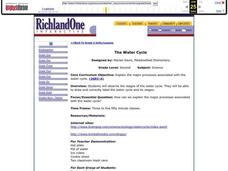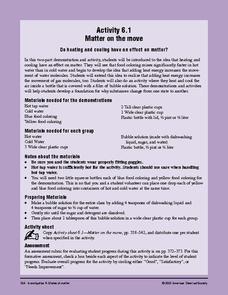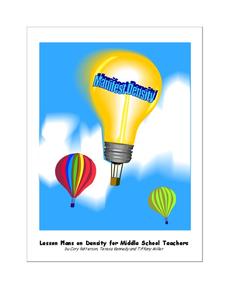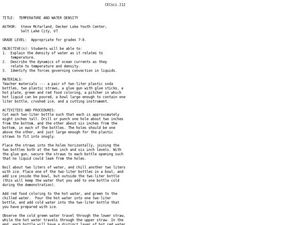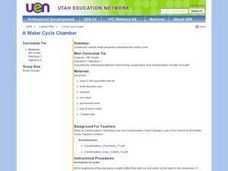Curated OER
The Water Cycle
Observe the stages of the water cycle by completing 3 activities. To help understanding of the water cycle your students can observe evaporation, the formation of frost, vapor and water and the process of distillation which is used to...
Museum of Science
Cloud in a Bottle
Perhaps one day humans will learn to control the weather. Future scientists simulate clouds and fog in a plastic bottle. They conduct an experiment where they place smoke and hot water in the bottle, then squeeze and release repeatedly....
American Chemical Society
Can Gases Dissolve in Water?
Why does soda fizz when opened? Learners discuss the appearance of bubbles in soda bottles when opened. In groups, they design and complete an experiment comparing the amount of carbon dioxide dissolving in cold versus hot liquids.
Kenan Fellows
Sustainability: Learning for a Lifetime – The Importance of Water
Water is essential for life—and understanding the importance of clean drinking water is essential in understanding sustainability! Show your environmental science class the basics of water testing and treatment through a week-long...
American Museum of Natural History
Be a Water Saver
Everyone must do their part to make a difference. The lesson link provides an 11-item questionnaire to reflect on conservation practices. Simple and straightforward, the lesson is perfect as a remote learning resource or as a tool for an...
Virginia Department of Education
Molar Heat of Fusion for Water
How can you describe heat of fusion in a way the class understands and relates the importance of this concept to present day issues? In this third instructional activity of the series, learners conduct an experiment, demonstrating the...
Discovery Education
Smoke on the Water
How do clouds form? Learners demonstrate the formation of clouds and the water cycle by testing four different setups in a plastic bottle. They identify the key components of a cloud to help them understand the process of cloud...
American Chemical Society
The Energy Efficiency of Heating Water
Can a small change in laboratory procedures save energy? Scholars test three different methods for heating water in a science lab. Then, they calculate the energy efficiency for each and compare them to determine which uses the least...
Curated OER
The Water Cycle
Second graders conduct an a water cycle experiment. In this water cycle lesson plan, 2nd graders observe a puddle of water, they predict how it got there and what will happen to it. Students watch a demonstration on the water cycle and...
Curated OER
Water Filtration
Students demonstrate the four of five procedures that municipal water plants use to purify water for drinking. A water filtration system is designed by a student and their partner. A data chart is made to record all observations when the...
Exploratorium
Water Sphere Lens
With a Florence flask or fishbowl, make a double convex lens and use it to examine an image. Because of the refraction, the image will be inverted. A simple explanation is provided here for you to share with your class as they...
American Chemical Society
Matter on the Move
Start this mini unit on matter out by demonstrating how food coloring behaves when placed in cold and in hot water. Then have the class experiment with warm water and soap film. Pupils will learn that an increase in thermal energy also...
Curated OER
Water, Water, Everywhere and Always on the Move
Middle schoolers create their own water cycle in a terrarium. In this water cycle lesson, students research the water cycle and complete a worksheet using the Internet. They create a water cycle of their own in a jar with stones, sand,...
Virginia Department of Education
The Hydrologic Cycle
There is the same amount of water on earth now as there was when it was formed. The water from your faucet could contain molecules that dinosaurs drank! Young scientists build their own hydrologic cycle model and observe it for five...
Curated OER
Where Do We Get Clean Water?
Students investigate the concept of a filter. They use simple supplies in order to construct one after watching a demonstration performed by the teacher. An important warning that the project water is not clean for drinking is included....
University of Southern Indiana
Manifest Density
There's a lot content packed into the four lessons of this physical science unit on density. From salad dressing to the water cycle and hot air balloons, these lessons engage students in hands-on activities that explore real-world...
Foundation for Water & Energy Education
How Can Work Be Done with Water Power? Activity C
Third in a set of lessons regarding reservoirs, dams, and hydropower, this involves a two-day hydropower plant simulation. Collaborative groups build, maintain, and finance the plant. The transparency of the reservoir setup can be...
Curated OER
History at Home: The Object Box
Students examine "artifacts". In this anthropology instructional activity, students analyze possible uses for objects such as washboards, hot water bottles, and old magazines. Students record and share their speculations with their...
Curated OER
Temperature and Water Density
Learners consider the effects of temperature on water density. In this Earth Science lesson, students evaluate a demonstration of cold and hot water currents in a model. Learners use two liter bottles and varied water temperatures with...
Curated OER
Cloud In a Bottle
In this cloud worksheet, learners use a clear plastic bottle to simulate the process of cloud formation. They drop a lit match into the bottle that contains water and shake it to form condensed water or clouds. They answer questions...
Curated OER
The Preparation of Teraamminecopper(II) Sulphate-1-water
In this complex salt worksheet, high schoolers create teraamminecopper(II)sulphate-1-water using copper(II)sulphate, concentrated ammonia and ethanol. Students determine the formula mass for their product, the theoretical yield of the...
Curated OER
A Very Simple Conductivity Meter
Students investigate the hardness of different water samples using the conductivity meter. For this chemistry lesson, students build their own meter following specific procedures. They identify an unknown sample of water.
Curated OER
A Water Cycle Chamber
Fourth graders are shown the water cycle by watching a demonstration by their teacher. In groups, they are given one two-liter bottle with a starter hole and follow instructions to complete the set up. They place ice cubes into the...
Curated OER
Water Quality Monitoring
Students comprehend the four parameters of water quality. They perform tests for salinity, dissolved oxygen, pH and clarity or turbidity. Students comprehend why scientists and environmental managers monitor water uality and aquatic...










